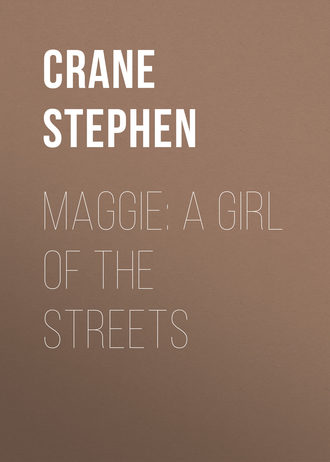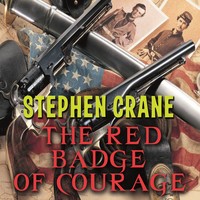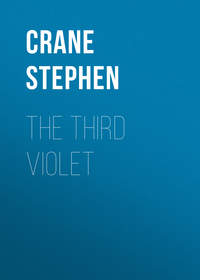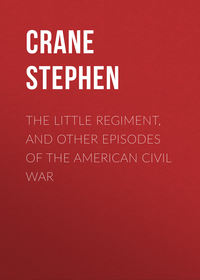 полная версия
полная версияMaggie: A Girl of the Streets
After a few moments' rest, the orchestra played crashingly, and a small fat man burst out upon the stage. He began to roar a song and stamp back and forth before the foot-lights, wildly waving a glossy silk hat and throwing leers, or smiles, broadcast. He made his face into fantastic grimaces until he looked like a pictured devil on a Japanese kite. The crowd laughed gleefully. His short, fat legs were never still a moment. He shouted and roared and bobbed his shock of red wig until the audience broke out in excited applause.
Pete did not pay much attention to the progress of events upon the stage. He was drinking beer and watching Maggie.
Her cheeks were blushing with excitement and her eyes were glistening. She drew deep breaths of pleasure. No thoughts of the atmosphere of the collar and cuff factory came to her.
When the orchestra crashed finally, they jostled their way to the sidewalk with the crowd. Pete took Maggie's arm and pushed a way for her, offering to fight with a man or two.
They reached Maggie's home at a late hour and stood for a moment in front of the gruesome doorway.
"Say, Mag," said Pete, "give us a kiss for takin' yeh teh deh show, will yer?"
Maggie laughed, as if startled, and drew away from him.
"Naw, Pete," she said, "dat wasn't in it."
"Ah, what deh hell?" urged Pete.
The girl retreated nervously.
"Ah, what deh hell?" repeated he.
Maggie darted into the hall, and up the stairs. She turned and smiled at him, then disappeared.
Pete walked slowly down the street. He had something of an astonished expression upon his features. He paused under a lamp-post and breathed a low breath of surprise.
"Gawd," he said, "I wonner if I've been played fer a duffer."
Chapter VIII
As thoughts of Pete came to Maggie's mind, she began to have an intense dislike for all of her dresses.
"What deh hell ails yeh? What makes yeh be allus fixin' and fussin'? Good Gawd," her mother would frequently roar at her.
She began to note, with more interest, the well-dressed women she met on the avenues. She envied elegance and soft palms. She craved those adornments of person which she saw every day on the street, conceiving them to be allies of vast importance to women.
Studying faces, she thought many of the women and girls she chanced to meet, smiled with serenity as though forever cherished and watched over by those they loved.
The air in the collar and cuff establishment strangled her. She knew she was gradually and surely shrivelling in the hot, stuffy room. The begrimed windows rattled incessantly from the passing of elevated trains. The place was filled with a whirl of noises and odors.
She wondered as she regarded some of the grizzled women in the room, mere mechanical contrivances sewing seams and grinding out, with heads bended over their work, tales of imagined or real girlhood happiness, past drunks, the baby at home, and unpaid wages. She speculated how long her youth would endure. She began to see the bloom upon her cheeks as valuable.
She imagined herself, in an exasperating future, as a scrawny woman with an eternal grievance. Too, she thought Pete to be a very fastidious person concerning the appearance of women.
She felt she would love to see somebody entangle their fingers in the oily beard of the fat foreigner who owned the establishment. He was a detestable creature. He wore white socks with low shoes.
He sat all day delivering orations, in the depths of a cushioned chair. His pocketbook deprived them of the power to retort.
"What een hell do you sink I pie fife dolla a week for? Play? No, py damn!" Maggie was anxious for a friend to whom she could talk about Pete. She would have liked to discuss his admirable mannerisms with a reliable mutual friend. At home, she found her mother often drunk and always raving. It seems that the world had treated this woman very badly, and she took a deep revenge upon such portions of it as came within her reach. She broke furniture as if she were at last getting her rights. She swelled with virtuous indignation as she carried the lighter articles of household use, one by one under the shadows of the three gilt balls, where Hebrews chained them with chains of interest.
Jimmie came when he was obliged to by circumstances over which he had no control. His well-trained legs brought him staggering home and put him to bed some nights when he would rather have gone elsewhere.
Swaggering Pete loomed like a golden sun to Maggie. He took her to a dime museum where rows of meek freaks astonished her. She contemplated their deformities with awe and thought them a sort of chosen tribe.
"What een hell do you sink I pie fife dolla a week for? Play? No, py damn!" Maggie was anxious for a friend to whom she could talk about Pete. She would have liked to discuss his admirable mannerisms with a reliable mutual friend. At home, she found her mother often drunk and always raving. It seems that the world had treated this woman very badly, and she took a deep revenge upon such portions of it as came within her reach. She broke furniture as if she were at last getting her rights. She swelled with virtuous indignation as she carried the lighter articles of household use, one by one under the shadows of the three gilt balls, where Hebrews chained them with chains of interest.
Jimmie came when he was obliged to by circumstances over which he had no control. His well-trained legs brought him staggering home and put him to bed some nights when he would rather have gone elsewhere.
Swaggering Pete loomed like a golden sun to Maggie. He took her to a dime museum where rows of meek freaks astonished her. She contemplated their deformities with awe and thought them a sort of chosen tribe.
Pete, raking his brains for amusement, discovered the Central Park Menagerie and the Museum of Arts. Sunday afternoons would sometimes find them at these places. Pete did not appear to be particularly interested in what he saw. He stood around looking heavy, while Maggie giggled in glee.
Once at the Menagerie he went into a trance of admiration before the spectacle of a very small monkey threatening to thrash a cageful because one of them had pulled his tail and he had not wheeled about quickly enough to discover who did it. Ever after Pete knew that monkey by sight and winked at him, trying to induce hime to fight with other and larger monkeys. At the Museum, Maggie said, "Dis is outa sight."
"Oh hell," said Pete, "wait 'till next summer an' I'll take yehs to a picnic."
While the girl wandered in the vaulted rooms, Pete occupied himself in returning stony stare for stony stare, the appalling scrutiny of the watch-dogs of the treasures. Occasionally he would remark in loud tones: "Dat jay has got glass eyes," and sentences of the sort.
When he tired of this amusement he would go to the mummies and moralize over them.
Usually he submitted with silent dignity to all which he had to go through, but, at times, he was goaded into comment.
"What deh hell," he demanded once. "Look at all dese little jugs! Hundred jugs in a row! Ten rows in a case an' 'bout a t'ousand cases! What deh blazes use is dem?"
Evenings during the week he took her to see plays in which the brain-clutching heroine was rescued from the palatial home of her guardian, who is cruelly after her bonds, by the hero with the beautiful sentiments. The latter spent most of his time out at soak in pale-green snow storms, busy with a nickel-plated revolver, rescuing aged strangers from villains.
Maggie lost herself in sympathy with the wanderers swooning in snow storms beneath happy-hued church windows. And a choir within singing "Joy to the World." To Maggie and the rest of the audience this was transcendental realism. Joy always within, and they, like the actor, inevitably without. Viewing it, they hugged themselves in ecstatic pity of their imagined or real condition.
The girl thought the arrogance and granite-heartedness of the magnate of the play was very accurately drawn. She echoed the maledictions that the occupants of the gallery showered on this individual when his lines compelled him to expose his extreme selfishness.
Shady persons in the audience revolted from the pictured villainy of the drama. With untiring zeal they hissed vice and applauded virtue. Unmistakably bad men evinced an apparently sincere admiration for virtue.
The loud gallery was overwhelmingly with the unfortunate and the oppressed. They encouraged the struggling hero with cries, and jeered the villain, hooting and calling attention to his whiskers. When anybody died in the pale-green snow storms, the gallery mourned. They sought out the painted misery and hugged it as akin.
In the hero's erratic march from poverty in the first act, to wealth and triumph in the final one, in which he forgives all the enemies that he has left, he was assisted by the gallery, which applauded his generous and noble sentiments and confounded the speeches of his opponents by making irrelevant but very sharp remarks. Those actors who were cursed with villainy parts were confronted at every turn by the gallery. If one of them rendered lines containing the most subtile distinctions between right and wrong, the gallery was immediately aware if the actor meant wickedness, and denounced him accordingly.
The last act was a triumph for the hero, poor and of the masses, the representative of the audience, over the villain and the rich man, his pockets stuffed with bonds, his heart packed with tyrannical purposes, imperturbable amid suffering.
Maggie always departed with raised spirits from the showing places of the melodrama. She rejoiced at the way in which the poor and virtuous eventually surmounted the wealthy and wicked. The theatre made her think. She wondered if the culture and refinement she had seen imitated, perhaps grotesquely, by the heroine on the stage, could be acquired by a girl who lived in a tenement house and worked in a shirt factory.
Chapter IX
A group of urchins were intent upon the side door of a saloon. Expectancy gleamed from their eyes. They were twisting their fingers in excitement.
"Here she comes," yelled one of them suddenly.
The group of urchins burst instantly asunder and its individual fragments were spread in a wide, respectable half circle about the point of interest. The saloon door opened with a crash, and the figure of a woman appeared upon the threshold. Her grey hair fell in knotted masses about her shoulders. Her face was crimsoned and wet with perspiration. Her eyes had a rolling glare.
"Not a damn cent more of me money will yehs ever get, not a damn cent. I spent me money here fer t'ree years an' now yehs tells me yeh'll sell me no more stuff! T'hell wid yeh, Johnnie Murckre! 'Disturbance'? Disturbance be damned! T'hell wid yeh, Johnnie—"
The door received a kick of exasperation from within and the woman lurched heavily out on the sidewalk.
The gamins in the half-circle became violently agitated. They began to dance about and hoot and yell and jeer. Wide dirty grins spread over each face.
The woman made a furious dash at a particularly outrageous cluster of little boys. They laughed delightedly and scampered off a short distance, calling out over their shoulders to her. She stood tottering on the curb-stone and thundered at them.
"Yeh devil's kids," she howled, shaking red fists. The little boys whooped in glee. As she started up the street they fell in behind and marched uproariously. Occasionally she wheeled about and made charges on them. They ran nimbly out of reach and taunted her.
In the frame of a gruesome doorway she stood for a moment cursing them. Her hair straggled, giving her crimson features a look of insanity. Her great fists quivered as she shook them madly in the air.
The urchins made terrific noises until she turned and disappeared. Then they filed quietly in the way they had come.
The woman floundered about in the lower hall of the tenement house and finally stumbled up the stairs. On an upper hall a door was opened and a collection of heads peered curiously out, watching her. With a wrathful snort the woman confronted the door, but it was slammed hastily in her face and the key was turned.
She stood for a few minutes, delivering a frenzied challenge at the panels.
"Come out in deh hall, Mary Murphy, damn yeh, if yehs want a row. Come ahn, yeh overgrown terrier, come ahn."
She began to kick the door with her great feet. She shrilly defied the universe to appear and do battle. Her cursing trebles brought heads from all doors save the one she threatened. Her eyes glared in every direction. The air was full of her tossing fists.
"Come ahn, deh hull damn gang of yehs, come ahn," she roared at the spectators. An oath or two, cat-calls, jeers and bits of facetious advice were given in reply. Missiles clattered about her feet.
"What deh hell's deh matter wid yeh?" said a voice in the gathered gloom, and Jimmie came forward. He carried a tin dinner-pail in his hand and under his arm a brown truckman's apron done in a bundle. "What deh hell's wrong?" he demanded.
"Come out, all of yehs, come out," his mother was howling. "Come ahn an' I'll stamp her damn brains under me feet."
"Shet yer face, an' come home, yeh damned old fool," roared Jimmie at her. She strided up to him and twirled her fingers in his face. Her eyes were darting flames of unreasoning rage and her frame trembled with eagerness for a fight.
"T'hell wid yehs! An' who deh hell are yehs? I ain't givin' a snap of me fingers fer yehs," she bawled at him. She turned her huge back in tremendous disdain and climbed the stairs to the next floor.
Jimmie followed, cursing blackly. At the top of the flight he seized his mother's arm and started to drag her toward the door of their room.
"Come home, damn yeh," he gritted between his teeth.
"Take yer hands off me! Take yer hands off me," shrieked his mother.
She raised her arm and whirled her great fist at her son's face. Jimmie dodged his head and the blow struck him in the back of the neck. "Damn yeh," gritted he again. He threw out his left hand and writhed his fingers about her middle arm. The mother and the son began to sway and struggle like gladiators.
"Whoop!" said the Rum Alley tenement house. The hall filled with interested spectators.
"Hi, ol' lady, dat was a dandy!"
"T'ree to one on deh red!"
"Ah, stop yer damn scrappin'!"
The door of the Johnson home opened and Maggie looked out. Jimmie made a supreme cursing effort and hurled his mother into the room. He quickly followed and closed the door. The Rum Alley tenement swore disappointedly and retired.
The mother slowly gathered herself up from the floor. Her eyes glittered menacingly upon her children.
"Here, now," said Jimmie, "we've had enough of dis. Sit down, an' don' make no trouble."
He grasped her arm, and twisting it, forced her into a creaking chair.
"Keep yer hands off me," roared his mother again.
"Damn yer ol' hide," yelled Jimmie, madly. Maggie shrieked and ran into the other room. To her there came the sound of a storm of crashes and curses. There was a great final thump and Jimmie's voice cried: "Dere, damn yeh, stay still." Maggie opened the door now, and went warily out. "Oh, Jimmie."
He was leaning against the wall and swearing. Blood stood upon bruises on his knotty fore-arms where they had scraped against the floor or the walls in the scuffle. The mother lay screeching on the floor, the tears running down her furrowed face.
Maggie, standing in the middle of the room, gazed about her. The usual upheaval of the tables and chairs had taken place. Crockery was strewn broadcast in fragments. The stove had been disturbed on its legs, and now leaned idiotically to one side. A pail had been upset and water spread in all directions.
The door opened and Pete appeared. He shrugged his shoulders. "Oh, Gawd," he observed.
He walked over to Maggie and whispered in her ear. "Ah, what deh hell, Mag? Come ahn and we'll have a hell of a time."
The mother in the corner upreared her head and shook her tangled locks.
"Teh hell wid him and you," she said, glowering at her daughter in the gloom. Her eyes seemed to burn balefully. "Yeh've gone teh deh devil, Mag Johnson, yehs knows yehs have gone teh deh devil. Yer a disgrace teh yer people, damn yeh. An' now, git out an' go ahn wid dat doe-faced jude of yours. Go teh hell wid him, damn yeh, an' a good riddance. Go teh hell an' see how yeh likes it."
Maggie gazed long at her mother.
"Go teh hell now, an' see how yeh likes it. Git out. I won't have sech as yehs in me house! Get out, d'yeh hear! Damn yeh, git out!"
The girl began to tremble.
At this instant Pete came forward. "Oh, what deh hell, Mag, see," whispered he softly in her ear. "Dis all blows over. See? Deh ol' woman 'ill be all right in deh mornin'. Come ahn out wid me! We'll have a hell of a time."
The woman on the floor cursed. Jimmie was intent upon his bruised fore-arms. The girl cast a glance about the room filled with a chaotic mass of debris, and at the red, writhing body of her mother.
"Go teh hell an' good riddance."
She went.
Chapter X
Jimmie had an idea it wasn't common courtesy for a friend to come to one's home and ruin one's sister. But he was not sure how much Pete knew about the rules of politeness.
The following night he returned home from work at rather a late hour in the evening. In passing through the halls he came upon the gnarled and leathery old woman who possessed the music box. She was grinning in the dim light that drifted through dust-stained panes. She beckoned to him with a smudged forefinger.
"Ah, Jimmie, what do yehs t'ink I got onto las' night. It was deh funnies' t'ing I ever saw," she cried, coming close to him and leering. She was trembling with eagerness to tell her tale. "I was by me door las' night when yer sister and her jude feller came in late, oh, very late. An' she, the dear, she was a-cryin' as if her heart would break, she was. It was deh funnies' t'ing I ever saw. An' right out here by me door she asked him did he love her, did he. An' she was a-cryin' as if her heart would break, poor t'ing. An' him, I could see by deh way what he said it dat she had been askin' orften, he says: 'Oh, hell, yes,' he says, says he, 'Oh, hell, yes.'"
Storm-clouds swept over Jimmie's face, but he turned from the leathery old woman and plodded on up-stairs.
"Oh, hell, yes," called she after him. She laughed a laugh that was like a prophetic croak. "'Oh, hell, yes,' he says, says he, 'Oh, hell, yes.'"
There was no one in at home. The rooms showed that attempts had been made at tidying them. Parts of the wreckage of the day before had been repaired by an unskilful hand. A chair or two and the table, stood uncertainly upon legs. The floor had been newly swept. Too, the blue ribbons had been restored to the curtains, and the lambrequin, with its immense sheaves of yellow wheat and red roses of equal size, had been returned, in a worn and sorry state, to its position at the mantel. Maggie's jacket and hat were gone from the nail behind the door.
Jimmie walked to the window and began to look through the blurred glass. It occurred to him to vaguely wonder, for an instant, if some of the women of his acquaintance had brothers.
Suddenly, however, he began to swear.
"But he was me frien'! I brought 'im here! Dat's deh hell of it!"
He fumed about the room, his anger gradually rising to the furious pitch.
"I'll kill deh jay! Dat's what I'll do! I'll kill deh jay!"
He clutched his hat and sprang toward the door. But it opened and his mother's great form blocked the passage.
"What deh hell's deh matter wid yeh?" exclaimed she, coming into the rooms.
Jimmie gave vent to a sardonic curse and then laughed heavily.
"Well, Maggie's gone teh deh devil! Dat's what! See?"
"Eh?" said his mother.
"Maggie's gone teh deh devil! Are yehs deaf?" roared Jimmie, impatiently.
"Deh hell she has," murmured the mother, astounded.
Jimmie grunted, and then began to stare out at the window. His mother sat down in a chair, but a moment later sprang erect and delivered a maddened whirl of oaths. Her son turned to look at her as she reeled and swayed in the middle of the room, her fierce face convulsed with passion, her blotched arms raised high in imprecation.
"May Gawd curse her forever," she shrieked. "May she eat nothin' but stones and deh dirt in deh street. May she sleep in deh gutter an' never see deh sun shine agin. Deh damn—"
"Here, now," said her son. "Take a drop on yourself."
The mother raised lamenting eyes to the ceiling.
"She's deh devil's own chil', Jimmie," she whispered. "Ah, who would t'ink such a bad girl could grow up in our fambly, Jimmie, me son. Many deh hour I've spent in talk wid dat girl an' tol' her if she ever went on deh streets I'd see her damned. An' after all her bringin' up an' what I tol' her and talked wid her, she goes teh deh bad, like a duck teh water."
The tears rolled down her furrowed face. Her hands trembled.
"An' den when dat Sadie MacMallister next door to us was sent teh deh devil by dat feller what worked in deh soap-factory, didn't I tell our Mag dat if she—"
"Ah, dat's annuder story," interrupted the brother. "Of course, dat Sadie was nice an' all dat—but—see—it ain't dessame as if—well, Maggie was diff'ent—see—she was diff'ent."
He was trying to formulate a theory that he had always unconsciously held, that all sisters, excepting his own, could advisedly be ruined.
He suddenly broke out again. "I'll go t'ump hell outa deh mug what did her deh harm. I'll kill 'im! He t'inks he kin scrap, but when he gits me a-chasin' 'im he'll fin' out where he's wrong, deh damned duffer. I'll wipe up deh street wid 'im."
In a fury he plunged out of the doorway. As he vanished the mother raised her head and lifted both hands, entreating.
"May Gawd curse her forever," she cried.
In the darkness of the hallway Jimmie discerned a knot of women talking volubly. When he strode by they paid no attention to him.
"She allus was a bold thing," he heard one of them cry in an eager voice. "Dere wasn't a feller come teh deh house but she'd try teh mash 'im. My Annie says deh shameless t'ing tried teh ketch her feller, her own feller, what we useter know his fader."
"I could a' tol' yehs dis two years ago," said a woman, in a key of triumph. "Yessir, it was over two years ago dat I says teh my ol' man, I says, 'Dat Johnson girl ain't straight,' I says. 'Oh, hell,' he says. 'Oh, hell.' 'Dat's all right,' I says, 'but I know what I knows,' I says, 'an' it 'ill come out later. You wait an' see,' I says, 'you see.'"
"Anybody what had eyes could see dat dere was somethin' wrong wid dat girl. I didn't like her actions."
On the street Jimmie met a friend. "What deh hell?" asked the latter.
Jimmie explained. "An' I'll t'ump 'im till he can't stand."
"Oh, what deh hell," said the friend. "What's deh use! Yeh'll git pulled in! Everybody 'ill be onto it! An' ten plunks! Gee!"
Jimmie was determined. "He t'inks he kin scrap, but he'll fin' out diff'ent."
"Gee," remonstrated the friend. "What deh hell?"
Chapter XI
On a corner a glass-fronted building shed a yellow glare upon the pavements. The open mouth of a saloon called seductively to passengers to enter and annihilate sorrow or create rage.
The interior of the place was papered in olive and bronze tints of imitation leather. A shining bar of counterfeit massiveness extended down the side of the room. Behind it a great mahogany-appearing sideboard reached the ceiling. Upon its shelves rested pyramids of shimmering glasses that were never disturbed. Mirrors set in the face of the sideboard multiplied them. Lemons, oranges and paper napkins, arranged with mathematical precision, sat among the glasses. Many-hued decanters of liquor perched at regular intervals on the lower shelves. A nickel-plated cash register occupied a position in the exact centre of the general effect. The elementary senses of it all seemed to be opulence and geometrical accuracy.
Across from the bar a smaller counter held a collection of plates upon which swarmed frayed fragments of crackers, slices of boiled ham, dishevelled bits of cheese, and pickles swimming in vinegar. An odor of grasping, begrimed hands and munching mouths pervaded.








